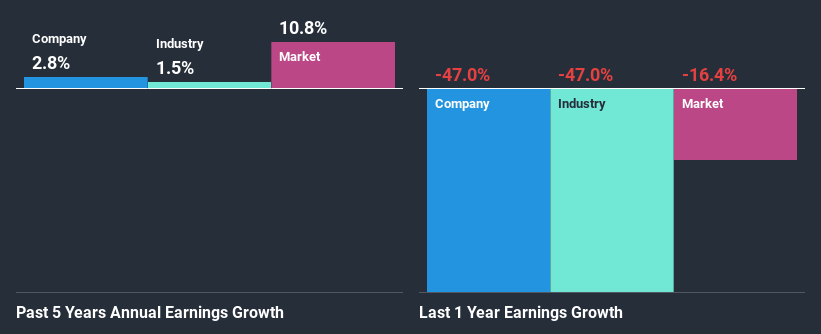Is Volution Group plc's (LON:FAN) Recent Stock Performance Influenced By Its Fundamentals In Any Way?
Volution Group's (LON:FAN) stock is up by a considerable 66% over the past three months. We wonder if and what role the company's financials play in that price change as a company's long-term fundamentals usually dictate market outcomes. Particularly, we will be paying attention to Volution Group's ROE today.
Return on equity or ROE is an important factor to be considered by a shareholder because it tells them how effectively their capital is being reinvested. Put another way, it reveals the company's success at turning shareholder investments into profits.
Check out our latest analysis for Volution Group
How Do You Calculate Return On Equity?
The formula for return on equity is:
Return on Equity = Net Profit (from continuing operations) ÷ Shareholders' Equity
So, based on the above formula, the ROE for Volution Group is:
5.5% = UK£9.7m ÷ UK£176m (Based on the trailing twelve months to July 2020).
The 'return' is the profit over the last twelve months. One way to conceptualize this is that for each £1 of shareholders' capital it has, the company made £0.06 in profit.
What Has ROE Got To Do With Earnings Growth?
We have already established that ROE serves as an efficient profit-generating gauge for a company's future earnings. Based on how much of its profits the company chooses to reinvest or "retain", we are then able to evaluate a company's future ability to generate profits. Generally speaking, other things being equal, firms with a high return on equity and profit retention, have a higher growth rate than firms that don’t share these attributes.
Volution Group's Earnings Growth And 5.5% ROE
On the face of it, Volution Group's ROE is not much to talk about. However, given that the company's ROE is similar to the average industry ROE of 5.3%, we may spare it some thought. On the other hand, Volution Group reported a fairly low 2.8% net income growth over the past five years. Bear in mind, the company's ROE is not very high . So this could also be one of the reasons behind the company's low growth in earnings.
We then compared Volution Group's net income growth with the industry and we're pleased to see that the company's growth figure is higher when compared with the industry which has a growth rate of 1.5% in the same period.
Earnings growth is a huge factor in stock valuation. It’s important for an investor to know whether the market has priced in the company's expected earnings growth (or decline). Doing so will help them establish if the stock's future looks promising or ominous. Has the market priced in the future outlook for FAN? You can find out in our latest intrinsic value infographic research report.
Is Volution Group Efficiently Re-investing Its Profits?
While the company did pay out a portion of its dividend in the past, it currently doesn't pay a dividend. We infer that the company has been reinvesting all of its profits to grow its business.
Upon studying the latest analysts' consensus data, we found that the company's future payout ratio is expected to drop to 29% over the next three years. The fact that the company's ROE is expected to rise to 15% over the same period is explained by the drop in the payout ratio.
Conclusion
On the whole, we do feel that Volution Group has some positive attributes. Namely, its high earnings growth. We do however feel that the earnings growth number could have been even higher, had the company been reinvesting more of its earnings and paid out less dividends. While we won't completely dismiss the company, what we would do, is try to ascertain how risky the business is to make a more informed decision around the company. You can see the 3 risks we have identified for Volution Group by visiting our risks dashboard for free on our platform here.
This article by Simply Wall St is general in nature. It does not constitute a recommendation to buy or sell any stock, and does not take account of your objectives, or your financial situation. We aim to bring you long-term focused analysis driven by fundamental data. Note that our analysis may not factor in the latest price-sensitive company announcements or qualitative material. Simply Wall St has no position in any stocks mentioned.
Have feedback on this article? Concerned about the content? Get in touch with us directly. Alternatively, email editorial-team (at) simplywallst.com.

 Yahoo Finance
Yahoo Finance 
